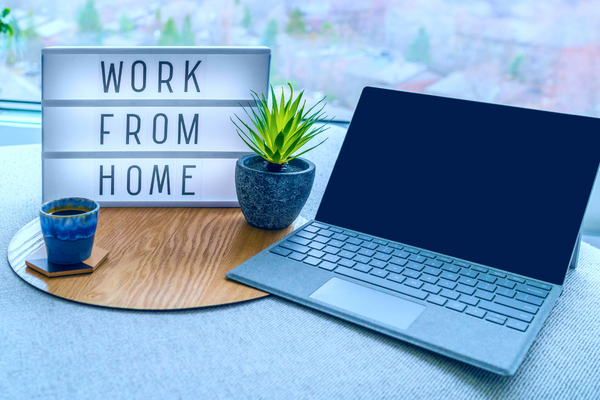Decreasing Energy Usage When Working From Home

It’s no surprise that in a post-pandemic world the number of people choosing to work from home maintains elevated. And while there are undoubted benefits, such as the decreasing of carbon emissions, travel expenses, and time – the rising costs of energy are becoming the number one downside to a home office.
In 2022 it was estimated that the average remote worker uses around 25% more electricity than a person working in a traditional office environment outside the home. While these statistics may sound discouraging, there are plenty of things that can be done to lessen the damage of your monthly energy bill. Check out our top tips for decreasing your energy consumption while working from home.
Turn appliances off at the plug
Leaving your electronics on stand-by is a common practice. However, turning your appliances off at the plug can make a noticeable difference to your yearly expenses. Don’t forget to unplug your mobile, laptop or other handheld devices once they reach full charge. Not only will doing so reduce your energy usage, but it will also extend your devices battery life. If you struggle to remember to turn your appliances off, consider purchasing smart plugs or other affordable smart home devices. Smart plugs allow you to automate your devices turning on and off using an app or voice commands.
Switch to energy saving lightbulbs and turn off lights
Did you know that lighting up our homes is responsible for almost 15% of our total energy usage throughout the year? There are several things that can be to reduce this, starting with simply turning off the lights that aren’t being used. Form a good habit and always switch off the lights when you leave a room! Consider changing out your lightbulbs for LED’s which use over 75% less energy when compared to a standard bulb – they are both more energy efficient as well as longer lasting. Remember to make full use of natural lighting and when possible, set up your working space near a natural light source (e.g., a window, skylight, or glass door).
Insulate and eliminate draughts
Many remote workers don’t have the resources for professional draught-proofing, but there are other budget friendly solutions which can help to insulate your home. Popular choices include draught proofing strips for doors and windows, chimney balloons, keyhole covers and letterbox flaps and brushes. A good habit is drawing the curtains as soon as the sun sets, as it will help to create a further barrier between your home and the outdoor temperature. Thick and heavyweight curtains are often considered best for the job as they provide more insulation than those made from lighter fabrics.
Reevaluate your heating usage and opt for layers
While we know that completely turning off the heating is neither realistic nor pleasant, we’ve all been guilty of turning the thermostat to full instead of putting on a jumper. In fact, research shows that by turning down the thermostat by just one degree you can decrease your energy bill by over £100 per year! So, make the most of your winter wardrobe and layer up! If you’re especially prone to the cold, choose more insulating fabrics such as wool, which has been scientifically proven to keep you warmer than other readily available fabrics. Finally, don’t waste energy by heating rooms you don’t use – instead designate a working space and close doors to improve heat retention. Remember that heat rises, therefore an upstairs office may prove a more efficient working space in the colder months.
As a small, remote business we understand the importance of optimising your home office while not breaking the bank! If you have any queries you would like to discuss or require any additional business support, we’d love to help! Get in touch:
T: 01903 688789 E: makeithappen@mbsmih.com




